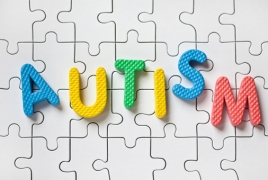Autism, anxiety among youth in focus of new research November 16, 2018 - 13:26 AMT PanARMENIAN.Net - Approximately 1 out of 59 adolescences are affected by autism spectrum disorder and between 50 to 80 percent may also have an anxiety disorder. Given this, and the current lack of treatment options for children with ASD and co-occurring anxiety, researchers from Baylor College of Medicine are working on developing a flexible, parent-led cognitive-behavioral intervention for children with ASD and anxiety, Baylor College of Medicine says. “When you think about the problems that impact children with ASD some of it has to do with the symptoms of the disorder, but some of it is the fact that their anxiety is incredibly debilitating,” said principal investigator Dr. Eric Storch, professor in the Menninger Department of Psychiatry and Behavioral Sciences. “We’ve found that the traditional treatments that we use to help kids as they develop anxiety do not work for children with ASD and co-occurring anxiety.” Through a previous study, researchers have identified a particular form of cognitive behavioral therapy that has worked well for children with ASD and co-occurring anxiety. However, this type of psychotherapy involves 12 to 16 clinic sessions with a therapist, which can be overwhelming and impractical for families. As an alternative to this “full-package” approach, researchers are now exploring a parent-led, individualized, stepped-care version of treatment that is being supported by a new grant from the Texas Higher Education Coordinating Board. A stepped-care model provides a lower-intensity first step as the initial treatment versus beginning with intensive therapy. Using this approach, researchers hope to pilot a treatment plan where parents of children with ASD and co-occurring anxiety work with their child’s therapist to learn how to deliver the treatment as opposed to the child seeing a clinician once a week over a longer period. “The idea is that parents might see the therapist for four sessions over an eight to 10 week period to help them develop a certain skillset, and then they go home and practice these new skills and techniques with their child. During each session with the therapist, the treatment will be tweaked so the dose of intervention is specific to what the child needs,” Storch said. He explained that the goal of this parent-led, stepped-care approach is to improve accessibility, efficiently use resources, provide personalized care and lower the cost of mental health treatment. “I’m very excited about this project because we are able to give free care to a population of families that really need support,” Storch said. “Through this grant, we are able to address a significant problem, do it without cost and hopefully develop a sustainable model that we can ultimately use to treat some of the psychiatric comorbidities that we see with great frequency in this group of children.” Other contributors to this study include Dr. Sophie Schneider, Dr. Leandra Berry, Dr. Robin Kochel and Dr. Alison Salloum. The researchers are affiliated with one or more of the following institutions: Baylor College of Medicine, Texas Children’s Hospital, University of South Florida. Authorities said a total of 192 Azerbaijani troops were killed and 511 were wounded during Azerbaijan’s offensive. In 2023, the Azerbaijani government will increase the country’s defense budget by more than 1.1 billion manats ($650 million). The bill, published on Monday, is designed to "eliminate the shortcomings of an unreasonably broad interpretation of the key concept of "compatriot". The earthquake caused a temporary blackout, damaged many buildings and closed a number of rural roads. Partner news |